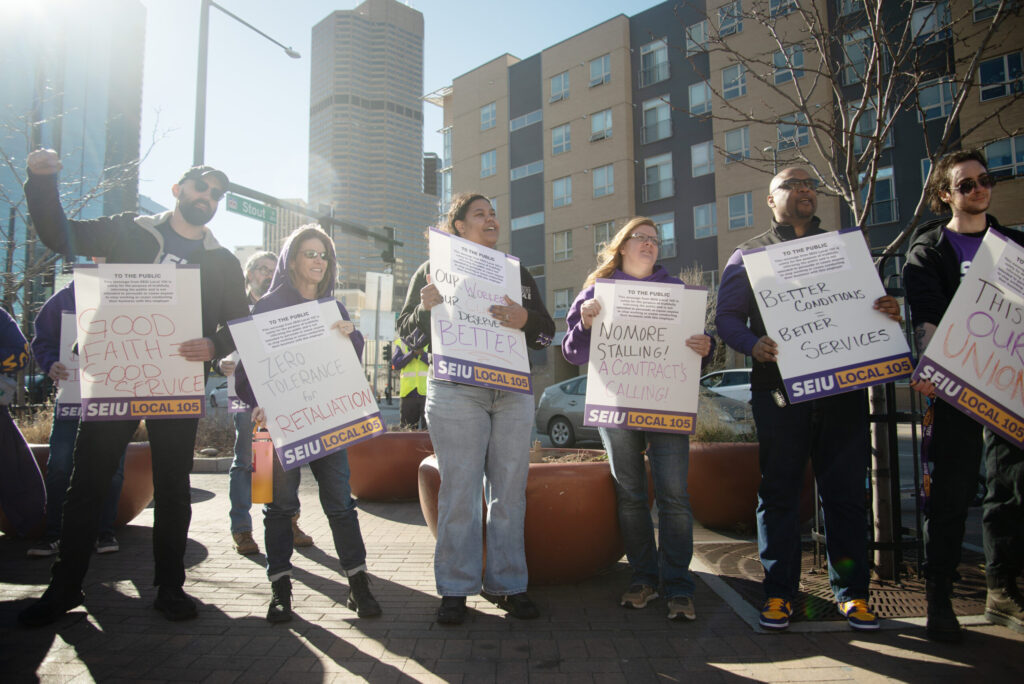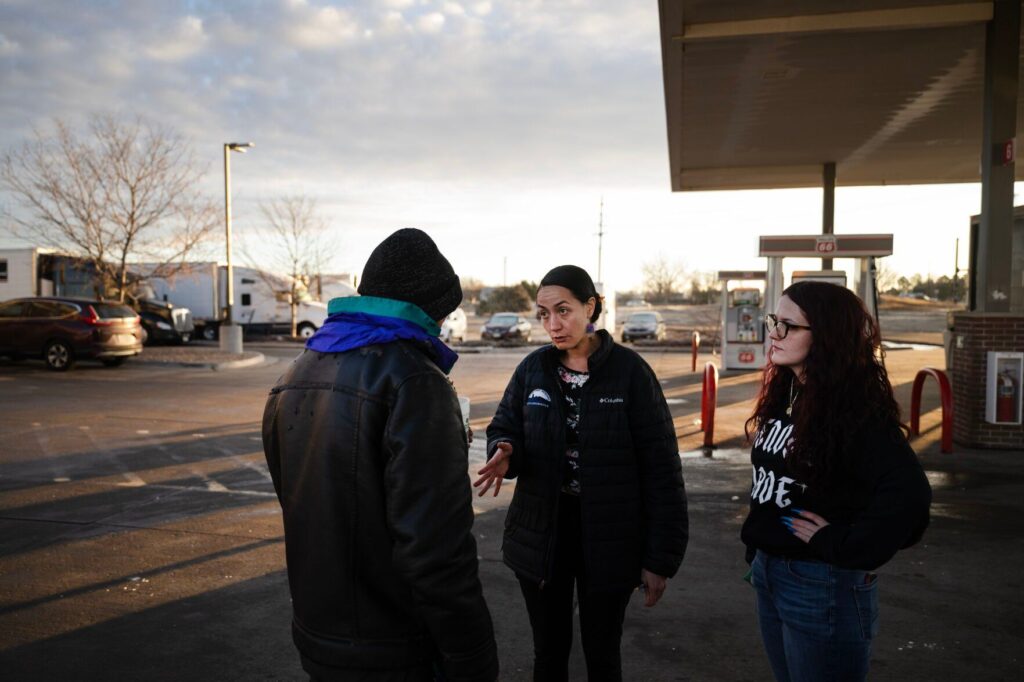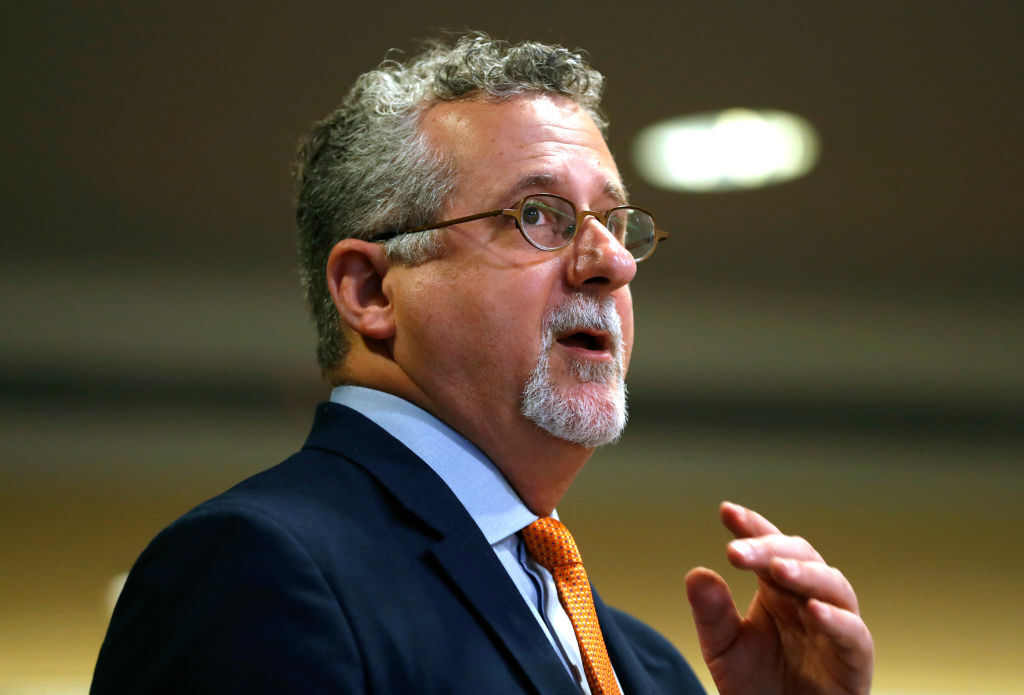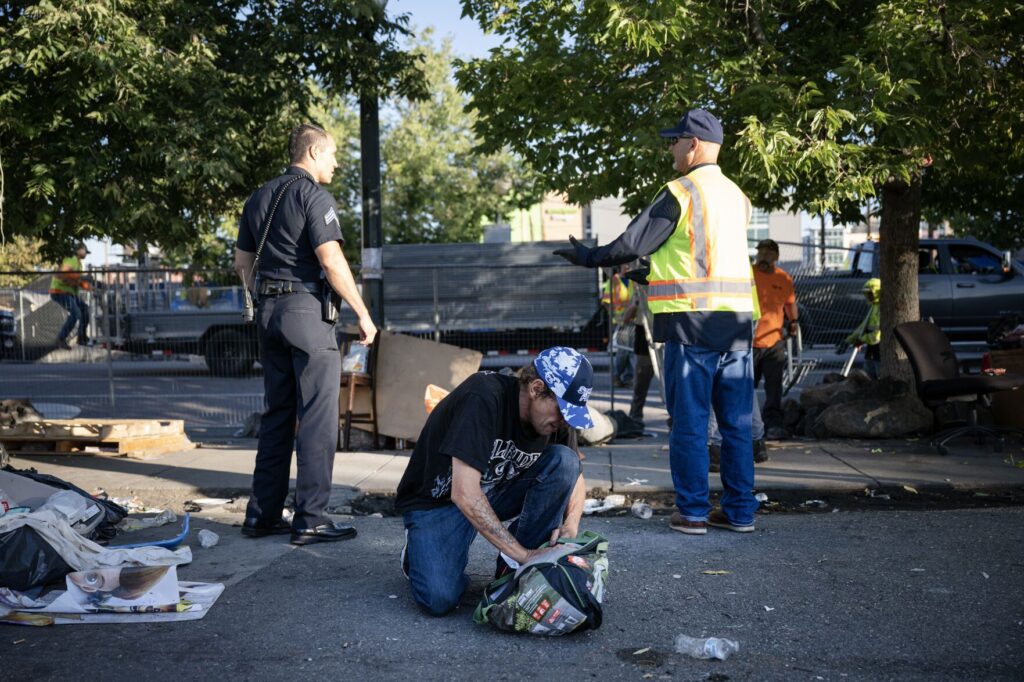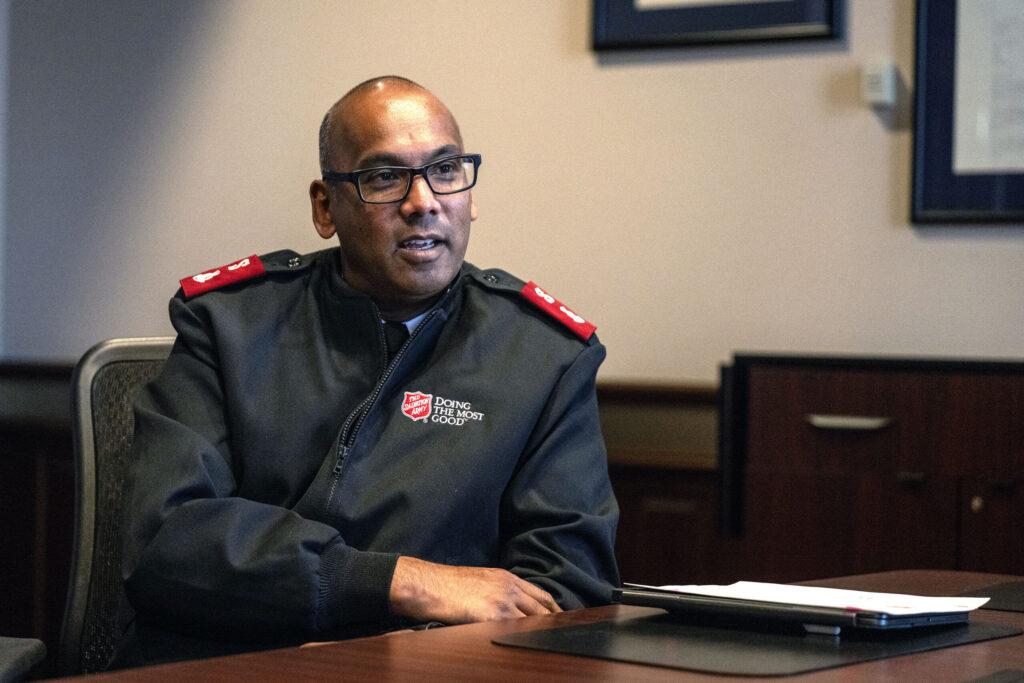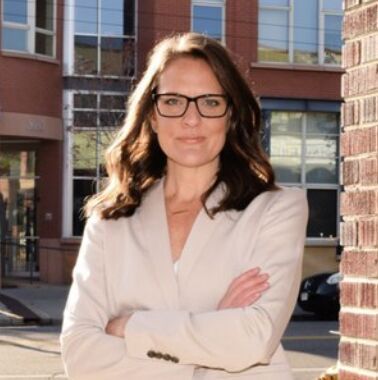Amid outbursts, Colorado Springs City Council postpones proposed vehicle camping ban
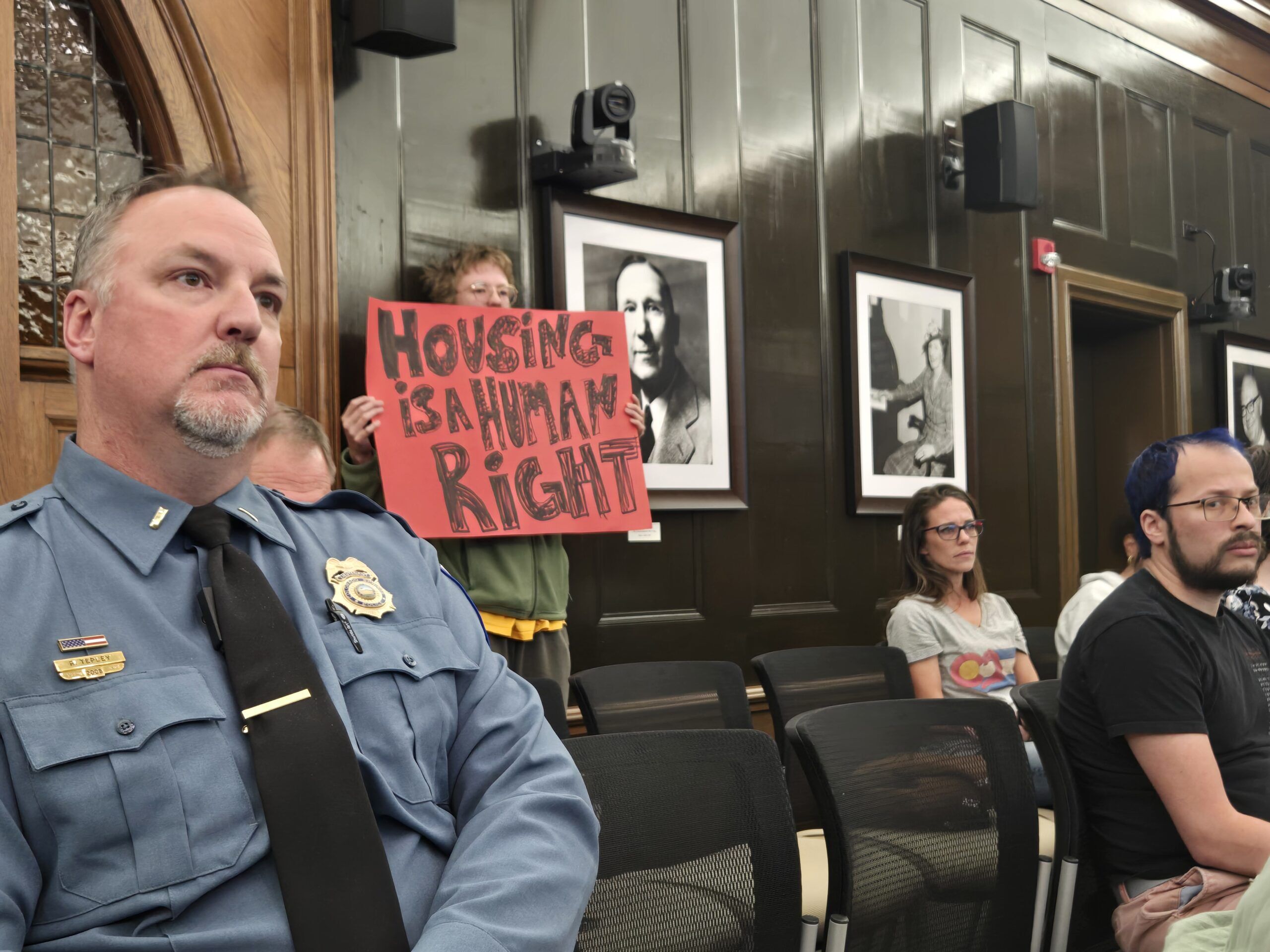
After about three hours of presentation, discussion and public comment, Colorado Springs City Council voted 5-4 Monday to postpone a proposal that would add a vehicle camping ban to city ordinances pertaining to illegal urban camping and consolidate them for standardization and consistency.
The issue will be taken up in six months, at the May 12 council meeting.
Opponents to the vehicle-camping ban in particular made a strong showing and included people who are or have been homeless, representatives from organizations that provide services to the homeless population, as well as high-profile community leaders such as Rabbi Iah Pillsbury, who leads Temple Beit Torah, and Dr. Jaeson Fournier, president and CEO of Peak Vista Community Health Centers.
“The reason so many of our citizens don’t have safe, affordable housing is because of us, the reason they don’t have a bathroom is because of us, and it’s your responsibility to fix it, just like it is ours,” Pillsbury told City Council. “Each and every one of us is only one or a few medical crises away from being in our cars or on the streets.”
Fournier said making living in a car susceptible to receiving a ticket would have “predictable health consequences” that would be more costly for the city’s hospitals, as people rely on their cars to store medications, and frequent displacement adds to physical and mental distress, sleep deprivation, anxiety, depression and difficulty reaching them.
“Policy will not reduce homelessness, it’ll only make it more precarious and increase costs,” he said.
Some at the meeting used outbursts, name-calling and swear words to deliver their impassioned views, primarily revolving around what many see as “criminalizing homelessness.”
The City Council’s plan called for banning camping in a vehicle for more than 24 hours in the same spot without moving at least 1,000 feet away or given permission to be on private, not public property.
“I don’t see any human dignity in this — we need to criminalize crimes, not homelessness,” Susan Bolduc, a member of the Colorado Springs Faith Leaders Table, told City Council.
“There isn’t a way for people to get help if they’re unfairly evicted, and this is the pipeline of homelessness. Law enforcement is part of the solution, yes, but we need all of our experts to weigh in,” she said. “We need a comprehensive plan.”
The focused idea of a revised ordinance ballooned into calls for the need to solve a host of problems associated with homelessness.
Councilmember David Leinweber said he’d like to see a long-range, citywide strategic plan be developed to address glaring gaps such as the city’s lack of a homeless shelter for teens under 18 years old, no shelter for people with disabilities and limited respite care.
“We don’t want a smorgasbord of free stuff and people come in here and use our resources and not address the problem,” he said. “We need to understand it better and how to achieve better outcomes.”
Both Colorado Springs Mayor Yemi Mobolade and Police Chief Adrian Vasquez supported the proposed ordinance, said Chief of Staff Jamie Fabos.
“The mayor does support this ordinance, in order to give Colorado Springs Police Department a tool they don’t have currently to move people along,” Fabos said. “We do feel there is a public safety interest, as Mayor Yemi has said when people don’t feel they can let their child play outside or walk to school when there’s an individual living on the street.”
Councilmember Dave Donelson made the proposal at the last work session two weeks ago, along with police representatives and the city attorney’s office.
Councilmember Nancy Henjum, who made the motion to postpone, said she wants a team of people to look at other ideas objectors to the proposal raised during the public comment period.
Those included having social workers instead of police officers approach motorists who are illegally parked in front of businesses and residences, and using churches and nonprofits to help create a “safe parking” program where people who are living in their vehicles could park safely and receive assistance securing employment and stable housing.
The latter model had been tried briefly during the pandemic, and an organization that was trying to ramp up a safe parking program did not get enough community support to sustain it.
“I feel we need to approach this particular ordinance through a holistic, comprehensive, not siloed, perspective,” Henjum said in response to a question from councilmember Tom Bailey of what waiting six months would accomplish.
“I think we need to involve more people. If we legislate without dealing with the people closest to the problem, we run the risk of not having effective solutions,” Henjum said.
Opponents said they were encouraged by the council’s decision.
Even members who didn’t support postponement indicated they wanted more discussion on the issue of homelessness, District 5 resident Eric Deutsch said after the vote.
“City Council has a lot of work to do to look at it holistically,” he said. “A lot of discussion seemed to be leaning on nonprofits and churches. But not having this punitive measure in place as winter approaches is a good thing.”
Police officers currently have no ability to issue a ticket for camping in cars, trucks, recreational vehicles near homes or businesses, although motorists can be issued a $50 parking fine for being in a spot for more than three days or 72 hours, officials said.
Complaints from residents and business owners have increased recently, said Lt. Ryan Tetley, who oversees the Police Department’s teams that do homeless outreach in camps, post notices about camp cleanups, enforce city laws, patrol shopping districts and other duties.
Officers have talked with 114 people camping in their vehicles so far this year, he said. With a new ordinance in place, police would have been able to ask them to move along within 24 hours to at least 1,000 feet away, or receive a citation and appear in municipal court to face up to a $2,500 fine, probation, jail time up to 189 days or any combination. Police also would offer materials on local shelters, housing programs, addiction treatment, food and other assistance.
“Practically speaking, that doesn’t happen much on who goes to jail in these cases,” Tetley said, adding that fines are not often sought on camping cases, either.
“Our approach is always compassion; you have to have a heart first and foremost,” he said. “We have a job as law enforcement to enforce the law, for the safety of all citizens.”
Old Colorado City homeowner David Vaillencourt said he’s lived on the west side for eight years and has witnessed domestic abuse, gunshots, campers parking for weeks on neighborhood streets and mounds of trash left behind.
“This is not about people truly down on their luck; it’s about the frequent fliers,” he said. “I think there should be a relocation limit, like 30 days, like on public land. This is part of broader national issues of inequality and housing.”
In a related issue, City Council did not table another proposal that would allow city park rangers to write tickets for violation of misuse of trails, including illegal parking on park property and various types of motorized vehicle use on trails.
Councilmembers instead agreed on a 7-2 vote to approve the measure from the city’s Parks, Recreation and Cultural Services department.


